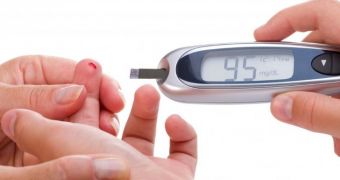Brainiacs at Brown University in the United States hope to develop a new test that would eliminate the need for diabetics to prick their finger on a regular basis in order to keep tabs on body sugar levels.
The test in question is based on a sensor that the specialists working on this research project claim has the ability to offer information concerning sugar levels in the body by analyzing not blood, but saliva.
In a paper in the journal Nanophotonics, the scientists explain that, just like blood, saliva too contains glucose. However, when compared to blood, its glucose content is much lower.
The sensor developed by this team of Brown University researchers relies on light, metal and a special enzyme to measure sugar concentrations in a given saliva sample.
As detailed by Medical Express, this sensor has until now only been put to work assessing the sugar content of lab-made saliva samples. During this series of experiments, it performed quite well.
However, what worries scientists is the fact that, in real-life conditions, the sensor has high chances to get confused by the presence of glucose originating from food and drinks in people's saliva.
Hence, they say that further investigations are in order. Add to this the fact that the Food and Drug Administration in the United States is not one to approve new treatments all that easily, and it might be a while until the sensor reaches the public.
Still, Dr. Joel Zonszein says that, all things considered, continuing work on this project seems to be well worth it, especially given the fact that, as of recently, the number of people diagnosed with diabetes has been steadily increasing.
“Everybody knows that diabetics have to prick their fingers to draw blood to check their blood sugar and then respond to that information. And they have to do that multiple times a day,” the researcher says in a statement.
“Just because there is an established way of measuring blood sugar, doesn't mean it's the only way. This is a priority area of research for many people. There's some hope that you may not have to prick yourself every couple of hours,” adds specialist Tayhas Palmore.

 14 DAY TRIAL //
14 DAY TRIAL //